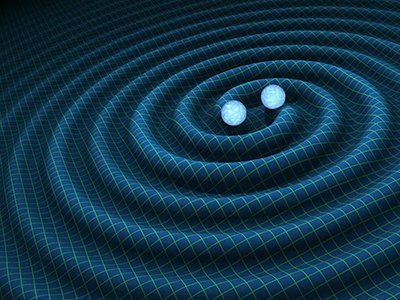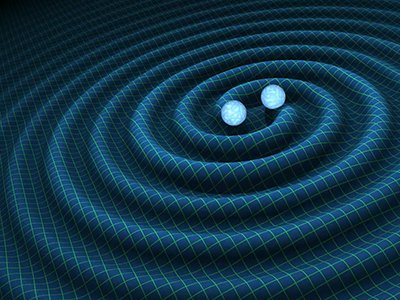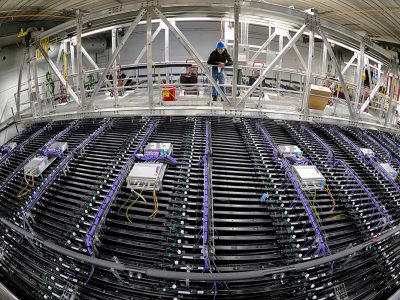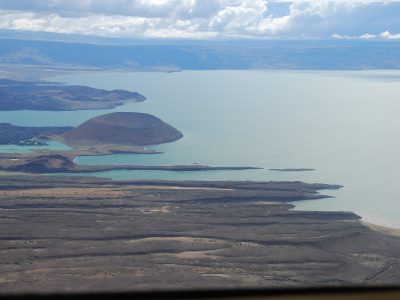As Albert Einstein predicted in his theory of relativity more than one hundred years ago, gravitational waves have been rippling through the fabric of space-time since the dawn of the cosmos. Only in the past decade have scientists observed actual proof of this elusive phenomenon. And in 2015, Syracuse University faculty played a leading role in that monumental discovery with the detection of gravitational waves from colliding black holes—a historic first in the field of astrophysics, ushering in a new era of astronomy.
 Syracuse University’s College of Arts and Sciences (A&S) continues to be at the forefront of astrophysics research with the opening of the Center for Gravitational Wave Astronomy and Astrophysics (CGWAA). The center will create a hub for students and faculty to participate in gravitational-wave astronomy, including the design of Cosmic Explorer, the next-generation observatory. The CGWAA will develop new technologies in quantum optics and precision measurement to build new detectors, advance knowledge of the universe through linking gravitational wave and electromagnetic observations and educate the next generation of scientists who will use gravitational-wave observations to explore supernovae, neutron stars and black holes.
Syracuse University’s College of Arts and Sciences (A&S) continues to be at the forefront of astrophysics research with the opening of the Center for Gravitational Wave Astronomy and Astrophysics (CGWAA). The center will create a hub for students and faculty to participate in gravitational-wave astronomy, including the design of Cosmic Explorer, the next-generation observatory. The CGWAA will develop new technologies in quantum optics and precision measurement to build new detectors, advance knowledge of the universe through linking gravitational wave and electromagnetic observations and educate the next generation of scientists who will use gravitational-wave observations to explore supernovae, neutron stars and black holes.
What is a gravitational wave? A&S explains.
“I am thrilled that we are launching the Center for Gravitational Wave Astronomy and Astrophysics,” says A&S Dean Behzad Mortazavi. “A&S is already a part of history with the role our researchers played in the breakthrough discovery of gravitational waves in 2015, garnering worldwide acclaim. Now as we establish the Center, Syracuse researchers will continue working with partners around the globe to expand the collective knowledge of the nature of matter and the origins of our Universe.”
Stefan Ballmer, an expert in the design and construction of gravitational-wave observatories, will serve as the inaugural director of the center. Ballmer and Duncan Brown, vice president for research at Syracuse University, were an integral part of the team that made the first detection of gravitational waves in 2015.
“Syracuse has been at the forefront of gravitational-wave astronomy since the beginning of the field,” says Brown. “Syracuse had the first LIGO [Laser Interferometer Gravitational-Wave Observatory] research group in the U.S. outside the LIGO Laboratory. Peter Saulson, Pomerantz Professor of Physics Emeritus, started the experimental group and made foundational contributions to the design and construction of LIGO. Peter served for four years as the spokesperson at of the LIGO Scientific Collaboration and he recruited both Stefan and me to Syracuse. Under Peter’s leadership, our students were part of the team during the first discoveries and Syracuse continues to advance the field.”
There are three new A&S faculty hires joining Ballmer and Brown, making the CGWAA one of the largest groups in experimental gravitational-wave physics in the United States: Georgia Mansell, assistant professor and an expert in quantum optics, Craig Cahillane, assistant professor and expert in high-power lasers, and Alexander Nitz G’15, associate professor and expert in using gravitational waves to understand their astrophysical sources. Eric Coughlin, an assistant professor who joined A&S in 2021, brings expertise in the way that sources of gravitational waves can also generate light observable with ground and space telescopes. Also joining the Center is Steve Penn, associate professor of physics at Hobart and William Smith Colleges, an expert on the optical coatings needed for future observatories. And finally, with the search for suitable sites for the next-generation observatory Cosmic Explorer becoming a priority, two faculty members of the Syracuse University Department of Earth and Environmental Sciences have also joined the Center: Joshua Russell, assistant professor of seismology, and Christopher Scholz, professor of paleolimnology and rift basin evolution.
Read More on National Science Foundation Grants Funding Researchers’ Work With Cosmic Explorer.
Syracuse University has a long history in physics with a direct lineage to Albert Einstein himself, going back to when it became a research university after World War II. Several star physicists were hired, including Peter Bergmann, who had worked with Einstein as a research assistant on both the unified field theory and relativity prior to A&S as a professor. Syracuse was one of the first universities in the country to study the general theory of relativity and try to reconcile it with quantum theory. Bergmann’s student, Joshua Goldberg G’50, ’52 Ph.D., who taught at Syracuse for over 50 years, became an expert on Einstein’s theory and helped bring some of the world’s greatest physicists to the University, including Sir Roger Penrose, winner of the 2020 Nobel Prize in Physics. He was also instrumental in starting the first serious experimental efforts to directly observe gravitational waves.
When the experimental efforts became concrete with the National Science Foundation’s LIGO project, Syracuse was the first university outside the LIGO laboratory to invest in the field, and hired Saulson, Martin A. Pomerantz ’37 Professor of Physics. Before moving to Syracuse University Saulson had been part of the LIGO team at MIT, and was the first person to realize that binary neutron stars could become LIGO’s standard sources. He went on to hire Brown and Ballmer, setting the seeds for today’s center.
“With the breakthrough discoveries of Advanced LIGO our field has transitioned from a cutting-edge fundamental physics experiment to an observation phase,” says Stefan Ballmer. “Today, Advanced LIGO observes gravitational waves from a black hole merger about every third day. But as exciting as this is, it pales in comparison to what the next-generation detectors of Cosmic Explorer promise: new observations every few minutes, with a reach to the earliest stages of the universe. Cosmic Explorer will be able to observe black holes merging in the most distant galaxies that even the James Webb Telescope can barely reveal as a red smudge. Gravitational-wave observations have truly become the new frontier in astrophysics.”
Heading up the CGWAA as the first director, Ballmer has been at Syracuse since 2010. Leading up to his contributions to LIGO’s Nobel Prize-winning work, he received an NSF CAREER Award in 2013 to support detector technology in the era of gravitational wave astrophysics. He was named a Fellow of the American Physical Society (APS) in 2021 for his critical role in the design and commissioning of the Advanced LIGO detectors and the scientific interpretation of their observations, leadership in the development of third-generation gravitational-wave detectors and mentoring of the next generation of gravitational-wave experimenters. A native of Switzerland, Ballmer has held a visiting associate professor position at the University of Tokyo; a postdoctoral fellowship at the National Astronomical Observatory of Japan; and a Robert A. Millikan Fellowship at Caltech. He earned a Ph.D. from MIT.
“Syracuse physics has gravity in our blood. The essential, but theoretical, contributions from Bergmann and Goldberg were actualized with the first gravitational waves detections, and we have moved from a theory on the chalkboard to an actualized experimental phenomenon,” says Jennifer Ross, professor and chair of the physics department. “With the creation of the Center and the group’s recent funding to design the Cosmic Explorer detector, Syracuse Physics will continue with its tradition of high impacts that will explore the inner workings of the cosmos.”
The center will open on Friday, Oct. 13, with a slate of programming from 1-4:30 p.m., in the Heroy Auditorium and in room 202 of the Physics Building. The event, open to the public, will include a scientific program, the center launch and a reception. Physics Chair Jennifer Ross and distinguished speakers will join from Princeton University, Harvard University and the Massachusetts Institute of Technology (MIT):
“Open Questions on the Dynamics of Black Holes”
Frans Pretorius, Professor of Physics, Princeton University
“All That Glitters Is Gold: Gravitational Waves, Light, and the Origin of the Heavy Elements”
Edo Berger, Professor of Astronomy, Harvard University
“Keynote address – Gravitational Waves: A New Window into the Universe”
Nergis Mavalavala, Dean of the School of Science, MIT, and Professor of Physics.
For all of the information about the opening of CGWAA, including time and location, visit the Syracuse Event Calendar.



